Israeli sanctions debate: Sánchez advocates while Merz wavers
In a significant diplomatic visit, German Chancellor Friedrich Merz journeyed to Spain for the first time since assuming office. The meeting between Merz and Spanish Prime Minister Pedro Sánchez focused on bilateral relations, European policy, and security policy.
However, the question of sanctions against Israel loomed large over their discussions. In early September, Spain imposed a complete arms embargo and banned entry for individuals involved in human rights violations, genocide, and war crimes in Gaza. This move was in response to Israel's military actions in the Gaza Strip, a stance that Spain shares with several other EU countries.
The issue of sanctions is a contentious one within the German government. The SPD advocates for more pressure on Israel, while the CSU is strictly against further sanctions. The CDU, on the other hand, opposes trade sanctions but shows some openness to personal sanctions. Chancellor Merz has emphasized Germany's support for Israel and has not committed to the EU Commission's sanctions proposal.
Pedro Sánchez has called for Israel to be treated similarly to Russia, which was excluded from the Eurovision Song Contest after its large-scale attack on Ukraine in 2022. Spain's broadcaster RTVE, one of the five major financial contributors, has threatened to withdraw from the Eurovision Song Contest 2026 if Israel participates.
Protests against the Israeli cycling team's participation in the Vuelta a España cycling race led to repeated issues this year, resulting in the team removing 'Israel' from its jerseys. Furthermore, Spain has joined South Africa in a genocide lawsuit against Israel at the International Criminal Court (ICC) in 2024.
The EU Commission proposed several punitive measures, including removing trade preferences that cover 37% of Israel's exports to the EU and imposing sanctions on radical politicians like Finance Minister Bezalel Smotrich and Police Minister Itamar Ben-Gvir. The German government will decide on the EU Commission's proposals by early October.
Sánchez expressed his support for the EU Commission's proposed sanctions, while Merz reiterated Germany's support for Israel but did not comment on the EU Commission's proposed sanctions directly. The German cabinet is still undecided, with internal disagreements yet to be resolved.
As Merz defended his decision to restrict arms exports to Israel in August, the visit to Spain marked a crucial moment in the ongoing debate over Israel sanctions within the EU. The outcome of this debate could have significant implications for the future of EU-Israel relations.
Read also:
- United States tariffs pose a threat to India, necessitating the recruitment of adept negotiators or strategists, similar to those who had influenced Trump's decisions.
- Weekly happenings in the German Federal Parliament (Bundestag)
- Southwest region's most popular posts, accompanied by an inquiry:
- Discussion between Putin and Trump in Alaska could potentially overshadow Ukraine's concerns








